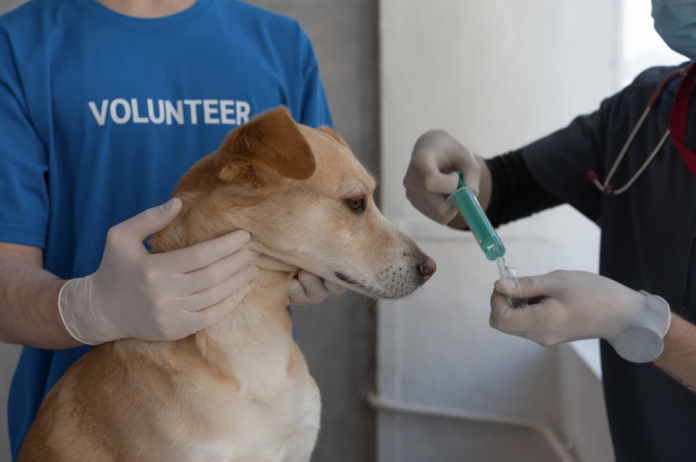Vaccines for Dogs: When to Get Them and Why
Vaccinations are an important part of keeping your dog healthy and happy. Regardless if you are a first time pet owner or a local registered dog breeder, vaccines can help protect your pet against many common and potentially dangerous diseases, some of which can be life-threatening.
As a responsible pet owner, it is important to understand the different types of vaccinations available for your dog, as well as when and how often they should be administered throughout their lifetime.
How do Dog Vaccinations Work
Vaccines work by introducing a small, weakened version of a virus into the body, which then stimulates the immune system to produce antibodies that can fight off the real virus.
This process usually leaves the dog feeling a little poorly, but nowhere near as sick as they would be if they caught the real thing. Vaccinations are mostly safe, and a vast majority of dogs will be fine within one to two days of getting their shots.
While vaccines are important for preventing a variety of illnesses, there are some exceptions such as allergies or other medical conditions that may make them unsafe for certain animals.
It’s always best to talk to your veterinarian about what vaccinations are appropriate for your particular dog. A Dachshund community website for example can provide some sort of guidance if you own a dachshund pet.
Core Vaccinations for Dogs
The core vaccines recommended for all dogs include those that protect them from distemper, hepatitis, leptospirosis, parvo, and parainfluenza.
These core vaccines are usually given as a combination shot called the DHLPP vaccine every three to four weeks until the puppy is around sixteen weeks old.
After this initial series of shots, these core vaccines should be boosted annually or every three years depending on the individual product label recommendations.
Other vaccinations that may be recommended depending on your pet’s lifestyle include leptospirosis (a bacterial infection), Lyme disease (spread through ticks), coronavirus (which causes gastrointestinal upset), influenza (which can affect both humans and dogs) and rattlesnake venom (which can cause severe illness).
All of these diseases have different symptoms so it’s important to talk to your veterinarian about whether or not they recommend any additional vaccines based on your pet’s lifestyle.
Requirements for rabies vaccines vary, as some countries, such as Australia, have eliminated cases of rabies in dogs. It’s best to check with your local laws and speak to your vet about the need for rabies vaccinations.
Vaccination Schedules
Dogs should receive their first vaccines when they’re puppies, usually between six and eight weeks of age. At this stage, puppies should be vaccinated against distemper, parvovirus, hepatitis, and parainfluenza.
These four diseases are highly contagious and can cause severe illness or even death in puppies who haven’t been vaccinated against them.
At 12 weeks of age, puppies should have their second round of vaccinations against the same four diseases listed above. It’s important to make sure that puppies receive both rounds of vaccinations in order for the vaccine to be effective.
When puppies reach 16 weeks old, they will often get another round of the DHLPP vaccination, though this varies depending on the brand of vaccine that your veterinarian uses. If necessary, they may also receive a rabies vaccine at this time.
After the puppy series has been completed at 16 weeks old, adult dogs will need booster shots every one to three years depending on the type of vaccine they receive and their lifestyle or environmental risk factors for disease exposure.
Ultimately it is best to follow your trusted veterinarian’s advice regarding the exact schedule of vaccinations for your specific dog.
Adhering to this schedule will be the best thing you can do to keep your dog protected.
Additional Treatments
Puppies should also receive deworming treatments at regular intervals throughout their first year of life to help prevent intestinal parasites such as roundworms and hookworms from taking hold in their system.
Deworming treatments are usually done monthly starting at two to three weeks of age until six months of age when stool samples can be taken for further parasite testing.
It is also important to stay up to date on heartworm prevention year round as heartworms can cause serious illness in dogs.
In most cases, this involves giving your pet a chewable tablet once per month, although some veterinarians may suggest using spot-on treatments instead depending on the risk factors associated with your particular pet’s lifestyle.
Finally, it is important to keep in mind that not all vaccinations offer the same level of protection or have the same duration of immunity so it is important to talk with your veterinarian about which products might best suit your pet’s needs.
Stay safe, and follow your veterinarian’s recommendations.
Facts Check
“Thank you for reading this article on petsguide.info. We hope you found it enjoyable.
What are your thoughts on the topic?
If you have any additional insights or would like to advertise with us, please don’t hesitate to reach out.
We welcome your feedback and encourage you to share this article with others.”






